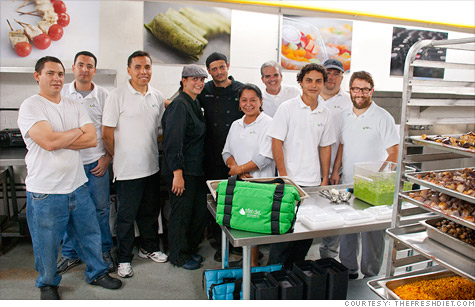Search News

A payroll tax credit would motivate Zalmi Duchman (R), owner of TheFreshDiet.com, to hire more quickly. But his CFO says access to capital is what really fuels growth.
NEW YORK (CNNMoney) -- President Obama has passed 17 tax breaks and credits for small businesses. But when it comes to job creation, they don't add up to much.
The scope of the tax breaks and credits is too narrow, the requirements too specific, and -- in some cases -- the process too onerous to get firms off the sidelines and onto the hiring battlefield.
"It's nice that you announce these things, but the question is how many actually make a difference," said Bill Dunkelberg, chief economist with the National Federation of Independent Business. "If I give you this cash gift in some form through all these tax credits, why would you suddenly desire to go hire somebody?"
Bringing on an employee is a long-term, expensive proposition that a business owner will not undertake unless the new employee will pay for itself in additional productivity, said Dunkelberg. "Getting a tax break doesn't change the value that a new employee brings to a company."
With the unemployment rate stuck at a stubbornly high 9.1%, the recovery of the economy depends on the nation's ability to create jobs. And since small businesses are responsible for creating about two-thirds of the new jobs in this country, supporting them is crucial.
That's why many will be all ears tonight when President Obama lays out details for his $300 billion job creation plan.
Nearly half of Obama's 17 tax breaks and credits were included in the Small Business Jobs Act, passed last September. One tax benefit allows small businesses to write off up to $500,000 worth of new equipment purchases last year and in 2011. And some of the tax credits, like the break for hiring unemployed workers, have already expired. The break on health care costs is available for a maximum of six years.
The tax credits, in some cases, are simple and attractive to small businesses, even if they have had limited impact on an owner's decision to get out of bunker mode and start hiring. Increasing the cap on how much a small business can expense, for example, was an especially easy-to-understand tax change, according to Bill Rys, tax counsel for the NFIB.
Others, like the zero capital gains tax on some small business investments, are so specific that they touch only a narrow segment of the sector, said Rys. And then ones like the health care tax credit are just too complicated to be of much use: "The challenge is you have to meet a number of different conditions to get it," he said.
It all comes back to jobs. "The truth is it is pretty hard to trace specific tax policies back to jobs created," said Joseph Rosenberg, a research associate at the nonpartisan Urban-Brookings Tax Policy Center. "There is simply too much going on."
The tax credits may motivate a few small business owners who are on the verge of making an investment already, but they aren't going to spur many of them to run out and make hires and purchases they don't need, said Rosenberg.
"What you are doing with tax policy is trying to impact things on the margin, you are trying to find that business that is very close to hiring, very close to buying that new machine," said Rosenberg. "You can fiddle with all these different tax levers, but at the end of the day what small business really needs is for the economy to recover."
For companies looking to hire, a payroll tax credit would be a boon: Small business owners who are growing and already planning to hire would be able to pay their new hires more or hire more quickly if a payroll tax credit were enacted.
Blue Sky Senior Living, an assisted living startup in Southfield, Mich., will be hiring about 120 people in the next year. And co-owner Nathan Mazur is interested in a payroll tax that would put money back in his pocket -- even if it is just temporary.
"People that are taking care of mom and dad are making $8 an hour in this industry," said Mazur, who plans to pay his staffers $10 per hour. But if he had access to a payroll tax credit, he would bump up that hourly wage even more. "I would never put my parents in a place where the workers are being paid $8 an hour. It just doesn't add up."
Zalmi Duchman, owner and CEO of TheFreshDiet.com, would also welcome a payroll tax credit. His firm delivers prepared, fresh food to clients across the country. Based out of Surfside, Fla., the five-year-old small business has been growing rapidly since. It currently has about 230 full-time employees and 70 contract employees across the country.
"We are always hiring because we are growing. But I wouldn't say we are super-hyperactive hiring," said Duchman. A payroll tax credit would motivate him to pull the trigger, he said. "You are growing and obviously you need to hire somebody that is going to help you generate revenue."
If a new payroll tax credit carried similar stipulations about who he could hire to receive it, Duchman might only be inspired to make one or two hires. But Duchman would hire more like five to 10 people if the tax credit were straightforward and immediate.
The ability to access capital is key to helping the business to expand, said Richard Silverman, TheFreshDiet.com's CFO.
"It is capital availability that matters, not the tax rate that you pay," said Silverman. "The difference between us paying a 35% corporate tax rate and a 25% corporate tax rate is peanuts at the end of the year compared to our ability to raise a couple million dollars when we need it. That is what is important. That is what creates jobs." ![]()